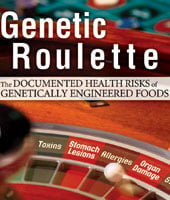Advertisement
Genetic Roulette
by Jeffrey M. SmithYes! Books, 2007, 312 pages, $34.95ISBN 978-0-9729665-2-8 On writing the highly acclaimed Seeds of Deception (Yes! Books) in 2003, Jeffrey M. Smith became one of America’s vocal champions against biotech industry claims for the safety of genetically modified foods. His sequel, Genetic Roulette, is an updated and more uncompromising reference work that … Continued

by Jeffrey M. Smith
Yes! Books, 2007, 312 pages, $34.95
ISBN 978-0-9729665-2-8
On writing the highly acclaimed Seeds of Deception (Yes! Books) in 2003, Jeffrey M. Smith became one of America’s vocal champions against biotech industry claims for the safety of genetically modified foods. His sequel, Genetic Roulette, is an updated and more uncompromising reference work that underscores how “eating genetically modified food is gambling with every bite.”
Genetic Roulette opens with a reminder from David Suzuki that we’re dealing with a revolutionary technology being used in our food supply affecting us, future generations, and the ecosystems on which we depend.”
How does genetic engineering work? (Or better yet, how does it not work?) What are the risks? Why are children more endangered? Smith presents mountains of scientific and other documentation for 40 suspected health risks associated with commonplace foods.
Were it not so well organized, this material would easily overwhelm the average reader. To his credit, Smith clearly understands his audience and has structured the book to satisfy three levels of readership.
This is a comprehensive work comprised of several two-page spreads. Each is a three-tiered mini-section that can either be quickly scanned, casually read, or read in depth. When the technical material becomes too detailed, the choice is always offered to pick those explanations that best suit our individual level of understanding.
There is much to be discovered behind the uninviting shock-value cover graphics of both books. Ultimately Ettlinger’s Twinkie stays informative, entertaining, and uncommitted to any cause except that of understanding what we put into our bodies. Smith’s Genetic Roulette maintains a more serious, less compromising edge that asks more from its readers.
Ettlinger and Smith ask many probing questions on behalf of the average consumer. Ultimately, they both force us to consider, “How and when does a chemical become a food?” Perhaps the most important question, however, is the one both books elicit from their readers: “Am I comfortable with this knowledge?”
By encouraging readers to take a personal stand on food choices and by challenging us to become more critical eaters, these progressive new food books serve us well.




